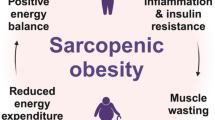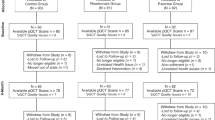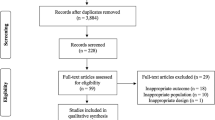Abstract
Summary
The aim of this study was to examine the gender-specific association between sarcopenia and bone geometry/metabolic parameters. Low muscle mass was associated with greater deterioration of bone than in deterioration of glucose or lipid profiles. This bone–muscle relationship was more prominent in men than in women.
Introduction
There are few studies that report on gender differences in the effects of low muscle mass on bone and metabolic parameters in elderly subjects. This study aimed to assess the gender-specific influence of muscle mass on bone and metabolic parameters.
Methods
A total of 2,264 participants (940 men and 1,324 women) whose age ranged from 65 to 92 years were analyzed using data from The Fourth Korea National Health and Nutrition Examination Surveys (2008–2009). We measured bone mineral density (BMD) and appendicular muscle mass using the dual-energy X-ray absorptiometry and also measured metabolic profiles.
Results
The age-related trend in bone and muscle coincided in men but not in women. Femoral neck (FN) and total hip (TH) BMD were highly correlated with muscle mass in both genders. However, in women, this correlation was not significant in the lumbar spine (LS). In addition, this positive correlation was stronger in the FN or TH than in the LS and was stronger in men than in women. Subjects with sarcopenia were at a higher risk for osteoporosis in the FN, TH, and LS in men, and in the TH and FN in women. The degree of association between muscle mass and metabolic profiles was relatively very weak.
Conclusion
Bone–muscle relationship was more prominent in men than in women. The gender differences in bone–muscle relationship may be helpful for the development of gender-specific preventive strategies in the elderly, especially in men.



Similar content being viewed by others
References
Baumgartner RN, Koehler KM, Gallagher D, Romero L, Heymsfield SB, Ross RR et al (1998) Epidemiology of sarcopenia among the elderly in New Mexico. Am J Epidemiol 147:755–763
Leveille SG (2004) Musculoskeletal aging. Curr Opin Rheumatol 16:114–118
Janssen I, Shepard DS, Katzmarzyk PT, Roubenoff R (2004) The healthcare costs of sarcopenia in the United States. J Am Geriatr Soc 52:80–85
Riggs BL, Melton LJ 3rd, Robb RA, Camp JJ, Atkinson EJ, Peterson JM et al (2004) Population-based study of age and sex differences in bone volumetric density, size, geometry, and structure at different skeletal sites. J Bone Miner Res 19:1945–1954
Mo C, Romero-Suarez S, Bonewald L, Johnson M, Brotto M (2012) Prostaglandin e2: from clinical applications to its potential role in bone–muscle crosstalk and myogenic differentiation. Recent Patents Biotechnol 6:223–229
Frost HM (2003) Bone's mechanostat: a 2003 update. Anat Rec A: Discov Mol Cell Evol Biol 275:1081–1101
Di Monaco M, Castiglioni C, Vallero F, Di Monaco R, Tappero R (2012) Sarcopenia is more prevalent in men than in women after hip fracture: a cross-sectional study of 591 inpatients. Arch Gerontol Geriatr 55:e48–e52
Kirchengast S, Huber J (2012) Sex-specific associations between soft tissue body composition and bone mineral density among older adults. Ann Hum Biol 39:206–213
Jiang LQ, Duque-Guimaraes DE, Machado UF, Zierath JR, Krook A (2013) Altered response of skeletal muscle to IL-6 in type 2 diabetic patients. Diabetes 62:355–361
Neve A, Corrado A, Cantatore FP (2011) Osteoblast physiology in normal and pathological conditions. Cell Tissue Res 343:289–302
Karsenty G (2011) Bone endocrine regulation of energy metabolism and male reproduction. C R Biol 334:720–724
Kim KM, Lim JS, Kim KJ, Choi HS, Rhee Y, Oh HJ et al (2013) Dissimilarity of femur aging in men and women from a Nationwide Survey in Korea (KNHANES IV). J Bone Miner Metab 31:144–152
Beck TJ, Looker AC, Ruff CB, Sievanen H, Wahner HW (2000) Structural trends in the aging femoral neck and proximal shaft: analysis of the Third National Health and Nutrition Examination Survey dual-energy X-ray absorptiometry data. J Bone Miner Res 15:2297–2304
Matthews DR, Hosker JP, Rudenski AS, Naylor BA, Treacher DF, Turner RC (1985) Homeostasis model assessment: insulin resistance and beta-cell function from fasting plasma glucose and insulin concentrations in man. Diabetologia 28:412–419
Tichet J, Vol S, Goxe D, Salle A, Berrut G, Ritz P (2008) Prevalence of sarcopenia in the French senior population. J Nutr Health Aging 12:202–206
Chin SO, Rhee SY, Chon S, Hwang YC, Jeong IK, Oh S et al (2013) Sarcopenia is independently associated with cardiovascular disease in older Korean adults: the Korea National Health and Nutrition Examination Survey (KNHANES) from 2009. PLoS One 8:e60119
Edwards M, Gregson C, Patel H, Jameson K, Harvey N, Sayer AA et al (2013) Muscle size, strength and physical performance and their associations with bone structure in the Hertfordshire Cohort Study. J Bone Miner Res. doi:10.1002/jbmr.1972
Lebrasseur NK, Achenbach SJ, Melton LJ 3rd, Amin S, Khosla S (2012) Skeletal muscle mass is associated with bone geometry and microstructure and serum insulin-like growth factor binding protein-2 levels in adult women and men. J Bone Miner Res 27:2159–2169
Heinonen A, McKay HA, Whittall KP, Forster BB, Khan KM (2001) Muscle cross-sectional area is associated with specific site of bone in prepubertal girls: a quantitative magnetic resonance imaging study. Bone 29:388–392
Ellman R, Spatz J, Cloutier A, Palme R, Christiansen BA, Bouxsein ML (2013) Partial reductions in mechanical loading yield proportional changes in bone density, bone architecture, and muscle mass. J Bone Miner Res 28:875–885
Pietrobelli A, Lee RC, Capristo E, Deckelbaum RJ, Heymsfield SB (1999) An independent, inverse association of high-density-lipoprotein-cholesterol concentration with nonadipose body mass. Am J Clin Nutr 69:614–620
Seeman E, Hopper JL, Young NR, Formica C, Goss P, Tsalamandris C (1996) Do genetic factors explain associations between muscle strength, lean mass, and bone density? A twin study. Am J Physiol 270:E320–E327
Hamrick MW, McNeil PL, Patterson SL (2010) Role of muscle-derived growth factors in bone formation. J Musculoskelet Neuronal Interact 10:64–70
Perrini S, Laviola L, Carreira MC, Cignarelli A, Natalicchio A, Giorgino F (2010) The GH/IGF1 axis and signaling pathways in the muscle and bone: mechanisms underlying age-related skeletal muscle wasting and osteoporosis. J Endocrinol 205:201–210
Lee KC, Lanyon LE (2004) Mechanical loading influences bone mass through estrogen receptor alpha. Exerc Sport Sci Rev 32:64–68
Jessop HL, Sjoberg M, Cheng MZ, Zaman G, Wheeler-Jones CP, Lanyon LE (2001) Mechanical strain and estrogen activate estrogen receptor alpha in bone cells. J Bone Miner Res 16:1045–1055
Kanbur-Oksuz N, Derman O, Kinik E (2004) Correlation of sex steroids with IGF-1 and IGFBP-3 during different pubertal stages. Turk J Pediatr 46:315–321
Thomas T, Burguera B (2002) Is leptin the link between fat and bone mass? J Bone Miner Res 17:1563–1569
Mudali S, Dobs AS (2004) Effects of testosterone on body composition of the aging male. Mech Ageing Dev 125:297–304
Calvani R, Joseph AM, Adhihetty PJ, Miccheli A, Bossola M, Leeuwenburgh C et al (2013) Mitochondrial pathways in sarcopenia of aging and disuse muscle atrophy. Biol Chem 394:393–414
Ali SS, Xiong C, Lucero J, Behrens MM, Dugan LL, Quick KL (2006) Gender differences in free radical homeostasis during aging: shorter-lived female C57BL6 mice have increased oxidative stress. Aging Cell 5:565–574
Acknowledgments
This work was supported by the National Research Foundation (NRF) of Korea grant funded by the Korea government (MEST) (No. 20110001024).
Conflicts of interest
None.
Author information
Authors and Affiliations
Corresponding author
Rights and permissions
About this article
Cite this article
Huh, J.H., Song, M.K., Park, K.H. et al. Gender-specific pleiotropic bone–muscle relationship in the elderly from a nationwide survey (KNHANES IV). Osteoporos Int 25, 1053–1061 (2014). https://doi.org/10.1007/s00198-013-2531-2
Received:
Accepted:
Published:
Issue Date:
DOI: https://doi.org/10.1007/s00198-013-2531-2




